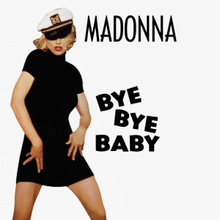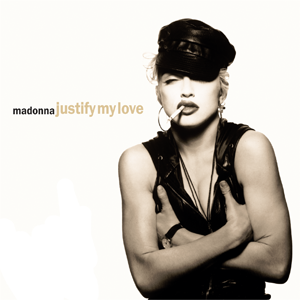
"Justify My Love" is a song by American singer Madonna from her first greatest hits album, The Immaculate Collection (1990). The song was written by Lenny Kravitz and Ingrid Chavez, with additional lyrics by Madonna; Kravitz also handled the production alongside André Betts. It was released as the lead single from the album on November 6, 1990, by Sire and Warner Bros. Records. Chavez was not credited on the song, which led to a lawsuit against Kravitz, eventually reaching an out-of-court settlement. Musically considered as a hip hop, dance, trip hop, and experimental pop track, it features spoken word vocals by Madonna as she releases her inner freak, touching on sexual fantasies and implying the position of a woman as the one sexually in control.

Erotica is the fifth studio album by American singer Madonna, released on October 20, 1992, by Maverick and Sire Records. The album was released simultaneously with Madonna's first book publication Sex, a coffee table book containing explicit photographs of the singer, and marked her first release under Maverick, her own multimedia entertainment company. For the album, the singer enlisted Shep Pettibone and André Betts, with whom she had collaborated on 1990's "Vogue" and The Immaculate Collection.

"The Power of Good-Bye" is a song by American singer Madonna, taken from her seventh studio album Ray of Light (1998). It was written by Madonna and Rick Nowels, and was produced by the singer with William Orbit and Patrick Leonard. The song was released as the fourth single from the album on September 22, 1998, being additionally distributed as a double A-Side single in the United Kingdom with "Little Star". Lyrically, the track talks about how free and empowering saying good-bye or ending a relationship can feel. The melancholy electronica ballad features shuffle beats, acoustic guitars and sweeping strings arranged by Craig Armstrong.

"Drowned World/Substitute for Love" is a song recorded by American singer Madonna for her seventh studio album, Ray of Light (1998). It was written and produced by Madonna and William Orbit, with additional songwriters including Rod McKuen, Anita Kerr and David Collins. McKuen and Kerr received the credits due to the usage of a sample from one of their songs, "Why I Follow the Tigers". "Drowned World/Substitute for Love" is an ambient pop song which lyrically describes Madonna's spiritual transformation to seek authentic love over superficial alliances.
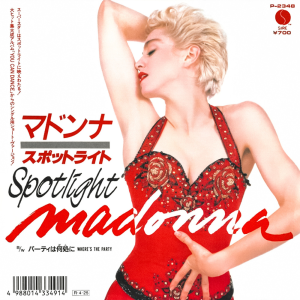
"Spotlight" is a song by American singer Madonna from her first remix album You Can Dance (1987). It was released as a single in Japan on April 25, 1988 by Sire Records and Warner-Pioneer Japan. Initially rejected during her True Blue album recording sessions, the song was written by Madonna, Stephen Bray and Curtis Hudson who had presented the original to the singer. The song was remixed by John "Jellybean" Benitez.

"Fever" is a song written by Eddie Cooley and Otis Blackwell, who used the pseudonym "John Davenport". It was originally recorded by American R&B singer Little Willie John for his debut album, Fever (1956), and released as a single in April of the same year. The song topped the Billboard R&B Best Sellers in the US and peaked at number 24 on the Billboard pop chart. It was received positively by music critics and included on several lists of the best songs when it was released.
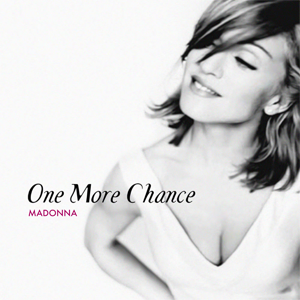
"One More Chance" is a song by American singer Madonna for her ballads compilation album, Something to Remember (1995). Written and produced by Madonna and David Foster, it was released on March 7, 1996 by Maverick Records as the album's second single in Australia and Japan, and the third single in the European countries. An acoustic pop ballad, the song lyrically talks about attempting to win a lost lover back. The song was inspired by Madonna's real life experience, but she wrote it from the opposite point of view.
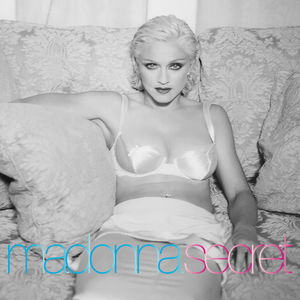
"Secret" is a song by American singer Madonna from her sixth studio album, Bedtime Stories (1994). It was released by Maverick Records on September 26, 1994, as the lead single from the album. The singer originally recorded the song as a demo with producer Shep Pettibone. However, Dallas Austin replaced Pettibone's role as the producer and reworked its composition, earning him a writing credit alongside Madonna. It was a departure from Madonna's previous musical style, since up to that point in her career, her music had mostly consisted of big-sounding dance tracks and melodic ballads. "Secret" combined the pop and R&B genres with instrumentation from an acoustic guitar, drums and strings, while lyrically talking about a lover having a secret.

"Rescue Me" is a song by American singer Madonna from her first greatest hits album, The Immaculate Collection (1990). Written and produced by Madonna and Shep Pettibone, the song was released as the second single from The Immaculate Collection on February 26, 1991, in the United States, and as the third single on April 7 in the United Kingdom. A dance-pop and gospel-house track, the song is accompanied by the sound of thunder and rain, with the lyrics talking of romantic love rescuing the singer.

"Erotica" is a song by American singer Madonna from her fifth studio album of the same name (1992). It was written and produced by both Madonna and Shep Pettibone, with additional writing from Anthony Shimkin. In Australia and most European countries, the song was released as the album's lead single on September 29, 1992; in the United States, it was set to be released the following day, but after being leaked and played on several radio stations, the release date was held back until October 13. The song continued Madonna's exploration of spoken word vocals, which she had introduced in "Justify My Love" (1990). A pop hip-hop and dance song with Middle Eastern influences, its lyrics talk about sadomasochism, with the singer using the alter ego Dita and inviting her lover to be submissive while she makes love to him.

"Deeper and Deeper" is a song by American singer Madonna from her fifth studio album, Erotica (1992). It was written and produced by both Madonna and Shep Pettibone, with additional writing from Anthony Shimkin. In Australia and most European countries, the song was released as the album's second single on November 17, 1992; in the United States, a release was issued on December 8. It was included on Madonna's second greatest hits compilation, GHV2 (2001). A dance-pop and deep house song, it has disco and Philadelphia soul influences; the bridge features instrumentation from flamenco guitars and castanets, and features background vocals from the singer's collaborators Donna De Lory and Niki Haris. Lyrically, the song talks about sexual desire, though it has been argued that it is actually about a young man coming to terms with his homosexuality, and includes a reference to Madonna's single "Vogue" (1990).
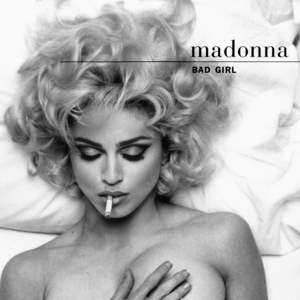
"Bad Girl" is a song by American singer and songwriter Madonna from her fifth studio album, Erotica (1992). It was written and produced by both Madonna and Shep Pettibone, with additional writing from Anthony Shimkin. In Australia and most European countries, the song was released as the album's third single on February 2, 1993; in the United States, a release was issued on March 11. "Bad Girl" is a pop and R&B ballad with lyrics that describe a woman trying to escape her reality through self-destructive behaviors, such as drinking and chain smoking.

"Rain" is a song by American singer Madonna from her fifth studio album, Erotica (1992). Written and produced by Madonna and Shep Pettibone, in Australia and most European countries, the song was released as the album's fifth single on July 17, 1993; in the United States, a release was issued on August 5. A pop ballad that mixes elements of R&B, trip-hop, and new-age music, its lyrics liken water and rainfall to the power of love.

"Human Nature" is a song by American singer Madonna for her sixth studio album Bedtime Stories (1994). It was written as an answer song to her critics, who had panned her provocative image of the previous two years and Madonna's release of sexually explicit works. Written and produced by Madonna and Dave Hall, "Human Nature" includes a looping sample from Main Source's 1994 track "What You Need", therefore its writers Shawn McKenzie, Kevin McKenzie and Michael Deering are also credited. The track was released on June 6, 1995, by Maverick Records as the fourth and final single from Bedtime Stories.

"This Used to Be My Playground" is a song recorded by American singer Madonna. It is the theme for the film A League of Their Own, which starred Madonna, and portrayed a fictionalized account of the real-life All-American Girls Professional Baseball League. Madonna was asked to record a song for the film's soundtrack. At that time she was busy recording her fifth studio album, Erotica, with producer Shep Pettibone. They worked on some ideas and came up with "This Used to Be My Playground" in two days. Once presented to director Penny Marshall's team, the song was released as a standalone single on June 16, 1992, by Warner Bros. Records. However, it was not available on the film's soundtrack due to contractual obligations and was later added to the Olympics-inspired Barcelona Gold compilation album, released that summer. The song was included on Madonna's 1995 ballads compilation Something to Remember.

"Love Won't Wait" is a song by English singer Gary Barlow from his debut studio album, Open Road (1997). It was released as the second single from the album on 9 April 1997 by BMG and RCA Records. The song was written by Madonna and Shep Pettibone, and was an unreleased demo from her Bedtime Stories (1994) studio sessions. Barlow came by the demo in 1997, while looking to record more songs for Open Road. He changed the lyrics to represent a male point of view rather than Madonna's, and recorded the track with Stephen Lipson as producer.

"Each Time You Break My Heart" is a song recorded by British singer Nick Kamen, for his eponymous debut studio album (1987). It was released by Sire Records on 2 November 1986 as his debut single in 7-inch and 12-inch maxi formats. Kamen had gained popularity by starring in a 1985 Levi's television commercial, later deciding to delve into the music business and signed a record deal with Sire. "Each Time You Break My Heart" was the lead single from his album, written and produced by Madonna and Stephen Bray. It was originally set to be included on Madonna's third studio album, True Blue (1986), but failed to make the final tracklist. Madonna also provided background vocals on the track.

"Irresistible" is a song by British dance-pop singer-songwriter Cathy Dennis, released in November 1992 as the second single from her second album, Into the Skyline (1992). The song was co-written and co-produced by Dennis, but failed to make the success of the previous singles. In the US, the single had three different promo CD singles, each with their own remixes each with a more acoustic song.

"Just a Dream" is a song recorded by American singer Donna de Lory for her eponymous debut studio album (1992). It was released as the album's second single on March 9, 1993, by MCA Records. The song was written and produced by Madonna and Patrick Leonard while composing the former's fourth studio album, Like a Prayer (1989). Since Madonna felt "Just a Dream" would not suit her discography, she gave it to de Lory for recording. After release, the song received mixed review from critics. "Just a Dream" debuted and peaked at number 71 on the UK Singles Chart and reached number ten on the US Dance Club Songs and number 17 on the Dance Singles Sales charts, respectively.
